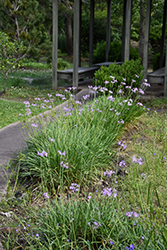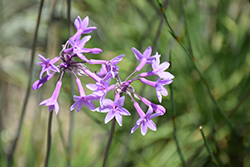>> Home
Height: 20 inches
Spacing: 12 inches
Sunlight:
![]()
![]()
Hardiness Zone: (annual)
Description:
A fast growing, clumping plant with narrow, strap like leaves that smell strongly of garlic when bruised; lovely lilac colored flowers in mid summer persist into fall; ideal for an herb garden, or containers
Edible Qualities
Society Garlic is an annual herb that is typically grown for its edible qualities, although it does have ornamental merits as well. The entire above-ground parts of the plant are edible, and are usually harvested from early summer to early fall. The edible parts have a mild taste and a distinctive fragrance.
The plant is most often used in the following ways:
- Fresh Eating
- Cooking
Planting & Growing
Society Garlic will grow to be about 16 inches tall at maturity, with a spread of 18 inches. When grown in masses or used as a bedding plant, individual plants should be spaced approximately 12 inches apart. Although it's not a true annual, this plant can be expected to behave as an annual in our climate if left outdoors over the winter, usually needing replacement the following year. As such, gardeners should take into consideration that it will perform differently than it would in its native habitat.
This plant is quite ornamental as well as edible, and is as much at home in a landscape or flower garden as it is in a designated herb garden. It does best in full sun to partial shade. It prefers to grow in average to moist conditions, and shouldn't be allowed to dry out. It is not particular as to soil pH, but grows best in rich soils. It is somewhat tolerant of urban pollution. This species is not originally from North America. It can be propagated by division.
Society Garlic is a good choice for the edible garden, but it is also well-suited for use in outdoor pots and containers. It can be used either as 'filler' or as a 'thriller' in the 'spiller-thriller-filler' container combination, depending on the height and form of the other plants used in the container planting. Note that when growing plants in outdoor containers and baskets, they may require more frequent waterings than they would in the yard or garden.

